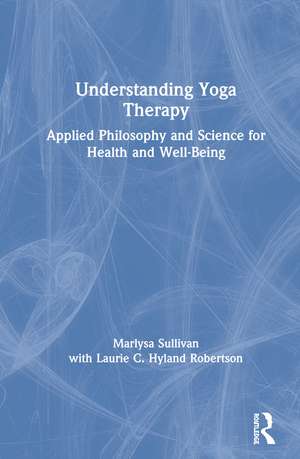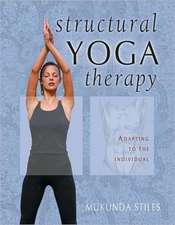Understanding Yoga Therapy: Applied Philosophy and Science for Health and Well-Being
Autor Marlysa B. Sullivan, Laurie C. Hyland Robertsonen Limba Engleză Hardback – 5 mai 2020
Readers will come away from the book understanding how the philosophy, texts, and teachings of yoga benefit a wide range of health conditions. The book is split into three helpful sections: Part I discusses foundational texts and their interpretations; Part II outlines the biopsychosocial-spiritual and neurophysiological model of integrative health pertinent to yoga therapy; and Part III focuses on practical applications separate from the more familiar diagnosis-driven models. Experiential activities and case studies throughout the text illuminate how yogic practices can be incorporated for optimal health.
Bridging the ancient and modern, philosophical and scientific, Understanding Yoga Therapy offers a clear explanatory framework for yoga therapists, physicians, allied and complementary healthcare providers, and their patients and students.
| Toate formatele și edițiile | Preț | Express |
|---|---|---|
| Paperback (1) | 232.82 lei 3-5 săpt. | +13.72 lei 7-13 zile |
| Taylor & Francis – 5 mai 2020 | 232.82 lei 3-5 săpt. | +13.72 lei 7-13 zile |
| Hardback (1) | 814.77 lei 6-8 săpt. | |
| Taylor & Francis – 5 mai 2020 | 814.77 lei 6-8 săpt. |
Preț: 814.77 lei
Preț vechi: 990.44 lei
-18% Nou
Puncte Express: 1222
Preț estimativ în valută:
155.94€ • 168.33$ • 130.76£
155.94€ • 168.33$ • 130.76£
Carte tipărită la comandă
Livrare economică 19 aprilie-03 mai
Preluare comenzi: 021 569.72.76
Specificații
ISBN-13: 9781138484542
ISBN-10: 1138484547
Pagini: 276
Ilustrații: 32
Dimensiuni: 152 x 229 mm
Greutate: 0.52 kg
Ediția:1
Editura: Taylor & Francis
Colecția Routledge
Locul publicării:Oxford, United Kingdom
ISBN-10: 1138484547
Pagini: 276
Ilustrații: 32
Dimensiuni: 152 x 229 mm
Greutate: 0.52 kg
Ediția:1
Editura: Taylor & Francis
Colecția Routledge
Locul publicării:Oxford, United Kingdom
Public țintă
Professional and Professional Practice & DevelopmentCuprins
Part I. 1. The Path of Yoga 2. Dharma, Ethics, and Right Action 3. Foundations for Discernment: Understanding Prakriti, Purusha, and the Gunas 4. Yoga Psychology: Body-Mind-Environment Relationships 5. The Subtle Body: Exploring Tantra and Prana Part II. 6. Explanatory Model for Yoga Therapy to Promote Health and Well-Being 7. Neurophysiological Perspectives 8. From Conceptual to Practical Application: Biomedical and Yogic Perspectives on Yoga Therapy Part III. 9. Setting the Stage for Well-Being: Practices for Cultivating Sattva Guna and Regulating the Body-Mind 10. Cultivating Healthy Sensitivity: Interoceptive Skills and Discriminative Wisdom 11. Yogic Practices to Support Resilience and Transformation
Notă biografică
Marlysa Sullivan is a physiotherapist, yoga therapist, and professor. Her research focuses on defining the framework and explanatory model for yoga therapy based on philosophical and neurophysiological perspectives.
Laurie C. Hyland Robertson is an editor and writer who specializes in yogic science and its intersections with healthcare. She is also a practicing yoga therapist.
Laurie C. Hyland Robertson is an editor and writer who specializes in yogic science and its intersections with healthcare. She is also a practicing yoga therapist.
Recenzii
"Understanding Yoga Therapy is an impressive, well-integrated, and scholarly volume. Marlysa Sullivan leads the reader through an intellectual journey exploring the interesting philosophical roots and health benefits of yoga. We learn that yoga is not merely a collection of physical postures and movements, but a system of instruction that leads to a deeper understanding of the human experience with the capacity to expand human potential." — Stephen W. Porges, PhD, Distinguished University Scientist, Indiana University; Professor of Psychiatry, University of North Carolina; and author of The Pocket Guide to the Polyvagal Theory: The Transformative Power of Feeling Safe"It is rare indeed to find a book that seamlessly blends the science, philosophy, and spirituality of yoga in a reader-friendly manner. This book integrates the best of the healing wisdom of Eastern traditions with the empirical approach of modern medical science, enhancing our perception of health, healing, life, and beyond. An especially admirable quality is the way Marlysa Sullivan has interwoven relevant stories from Indian culture into various chapters, thus enabling us to somatically "feel" the experiential aspects of yoga therapy. She is indeed one of the brightest minds in modern yoga therapy, and this work is a substantial contribution to the field, indispensable to anyone wishing for a comprehensive understanding of yoga’s transformative nature." —Yogacharya Dr Ananda Balayogi Bhavanani, MBBS, MD (AM), DSc (Yoga), C-IAYT, director, CYTER of Sri Balaji Vidyapeeth
"Understanding Yoga Therapy is about personal transformation. This unique book demonstrates how the ancient teachings of yoga can be used clinically to help alleviate suffering. Yoga therapy is a new field of study, and there are many misunderstandings about how it is similar to or different from professions such as physical therapy, occupational therapy, and even psychotherapy. Once you read this book, you will understand how yoga therapy is uniquely positioned to help each of us heal our deepest spiritual wounds, as well as create balance on our mental, emotional, and physical layers. Yoga therapy is person-centered and focuses on improving function and also creating well-being—this book clearly explains how it works." —Amy Wheeler, PhD, C-IAYT, president, International Association of Yoga Therapists, and founder, Optimal State Yoga Therapy
"Marlysa Sullivan takes her readers through an engrossing journey in Understanding Yoga Therapy. The journey begins with the yoga texts—the Upanishads, the epics, and of course, Patanjali’s Yoga Sutras. The concepts relevant to yoga therapy are explained in a way which makes them easy to understand and apply in daily life. Concepts essential to understanding yoga, such as dharma, the trigunas, the pancha koshas, and the kleshas, are explained with clarity, with well-designed diagrams and appropriate references. Marlysa Sullivan ties up these concepts with those drawn from contemporary neuroscience and psychology, giving readers clarity about the psychophysiology of happiness, the polyvagal theory, and how yoga helps to achieve holistic healing and well-being. This book is a must-read for all those in yoga, as the author blends ancient and contemporary concepts concisely and in a very readable way." —Shirley Telles MBBS, PhD (Neurophysiology), DSc (Yoga), director, Patanjali Research Foundation
"With this masterful text, Marlysa Sullivan has cemented her position as the premier scholarly author on the application of yoga as a therapy. Unlike other texts that have overlaid a range of yoga principles and practices onto a contemporary health-science framework, Understanding Yoga Therapy is strongly founded in the full yoga framework, upon which a number of health-science principles are layered. All the multifaceted aspects of the yoga darshan as a path to well-being are explored, and the interweaving of contemporary health-science is remarkably seamless and honors the rich yoga tradition. This well-referenced and thorough text should become an essential part of every yoga professional’s library." —Leigh Blashki, C-IAYT, founder, Australian Institute of Yoga Therapy
"Understanding Yoga Therapy is about personal transformation. This unique book demonstrates how the ancient teachings of yoga can be used clinically to help alleviate suffering. Yoga therapy is a new field of study, and there are many misunderstandings about how it is similar to or different from professions such as physical therapy, occupational therapy, and even psychotherapy. Once you read this book, you will understand how yoga therapy is uniquely positioned to help each of us heal our deepest spiritual wounds, as well as create balance on our mental, emotional, and physical layers. Yoga therapy is person-centered and focuses on improving function and also creating well-being—this book clearly explains how it works." —Amy Wheeler, PhD, C-IAYT, president, International Association of Yoga Therapists, and founder, Optimal State Yoga Therapy
"Marlysa Sullivan takes her readers through an engrossing journey in Understanding Yoga Therapy. The journey begins with the yoga texts—the Upanishads, the epics, and of course, Patanjali’s Yoga Sutras. The concepts relevant to yoga therapy are explained in a way which makes them easy to understand and apply in daily life. Concepts essential to understanding yoga, such as dharma, the trigunas, the pancha koshas, and the kleshas, are explained with clarity, with well-designed diagrams and appropriate references. Marlysa Sullivan ties up these concepts with those drawn from contemporary neuroscience and psychology, giving readers clarity about the psychophysiology of happiness, the polyvagal theory, and how yoga helps to achieve holistic healing and well-being. This book is a must-read for all those in yoga, as the author blends ancient and contemporary concepts concisely and in a very readable way." —Shirley Telles MBBS, PhD (Neurophysiology), DSc (Yoga), director, Patanjali Research Foundation
"With this masterful text, Marlysa Sullivan has cemented her position as the premier scholarly author on the application of yoga as a therapy. Unlike other texts that have overlaid a range of yoga principles and practices onto a contemporary health-science framework, Understanding Yoga Therapy is strongly founded in the full yoga framework, upon which a number of health-science principles are layered. All the multifaceted aspects of the yoga darshan as a path to well-being are explored, and the interweaving of contemporary health-science is remarkably seamless and honors the rich yoga tradition. This well-referenced and thorough text should become an essential part of every yoga professional’s library." —Leigh Blashki, C-IAYT, founder, Australian Institute of Yoga Therapy
Descriere
Understanding Yoga Therapy offers a comprehensive and accessible perspective on yoga therapy as a complementary, integrative route to promoting whole-person well-being.



